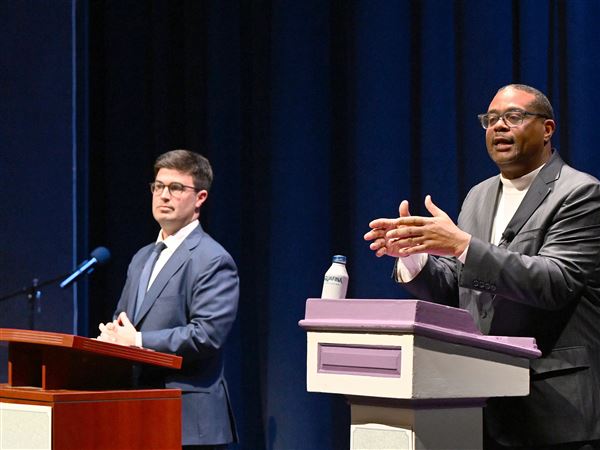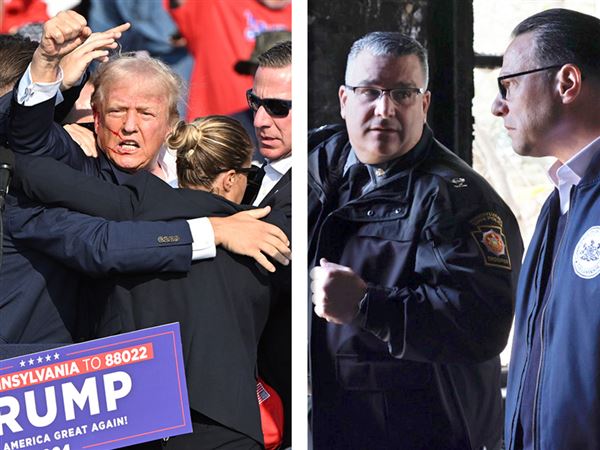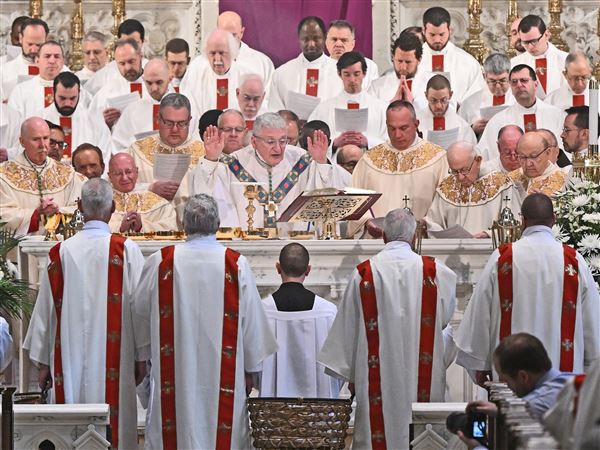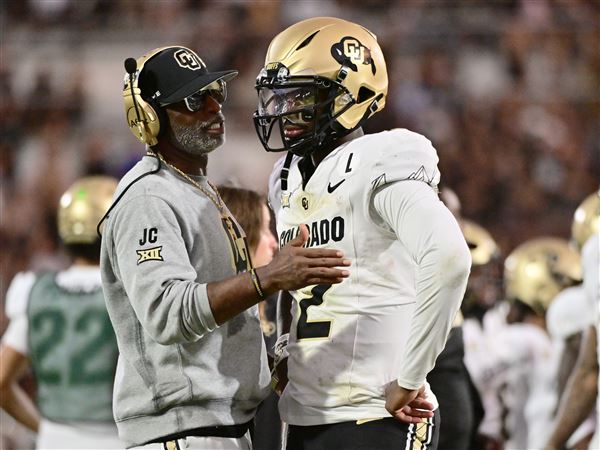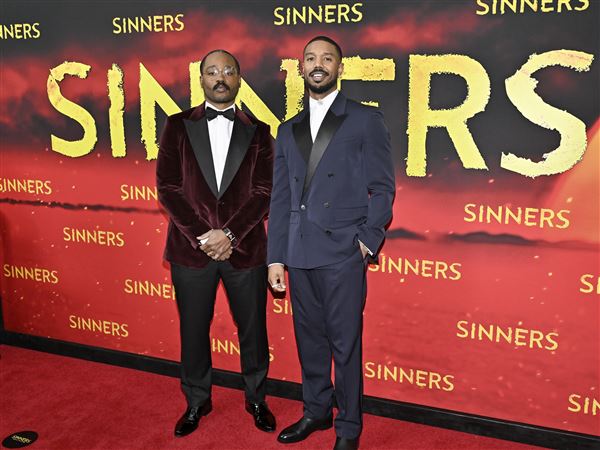When Stephen Flaherty first stepped into the ring with Sylvester Stallone, he was uncertain he’d be able to land any punches.
“We met at a hotel, and he’d brought his brother and the rest of his posse,” said Mr. Flaherty, a Tony Award-winning composer. It was 2006, and the Dormont native and his writing partner, lyricist Lynn Ahrens, were auditioning for the chance to write “Rocky,” the musical.
They, a singer friend of theirs and Thomas Meehan, who was working on the show’s book with Mr. Stallone, took the train down from New York City to Philadelphia. The longtime writing team of Flaherty and Ahrens brought several spec songs for Mr. Stallone’s consideration.
It was a show-me throwdown in a crowded room.
“The piano had maybe 40 working keys out of 88, and you know this is the moment when you’re either going to go forward or you’re not,” Mr. Flaherty said. “So it was not a great situation, but I knew I had to pull it out and get the song across.”
They chose to first present “Fight From the Heart,” which starts softly but ends big.
“Fight From the Heart” finished … and they waited.
“At the end of the song, [Mr. Stallone] teared up and he smacked the table with this giant fist that he has, these enormous, action-figure-type hands, and he screamed, ‘That’s it!’
“So, we knew the man who had created Rocky thought we had done justice to the character,” Mr. Flaherty said. “The rest of the three songs went by a little easier.”
The remaining numbers didn’t make it into the show, which has its Broadway opening Thursday. But “Fight From the Heart” did, and it plays a crucial part late in the first act.
Knowing that audiences were going to be skeptical of a singing, dancing “Rocky,” the writers and director Alex Timbers wanted to immerse them slowly. “My Nose Ain’t Broken” comes about 10 minutes into Act 1, and it’s the first time Rocky Balboa — played by Andy Karl — sings.
“The question was, how does Rocky sing? How would you get that? So, creating the world, musically, and having him enter last, is how we’ve done it.”
That “Rocky” is a singing, dancing, boxing musical all seems a bit beyond the pale.
“First of all, everyone’s reaction to ‘Rocky,’ the musical, is ‘What? That sounds crazy.’ It was everyone’s reaction, including my own, because [the 1976 Stallone film, an Academy Award winner for best picture] is a very naturalistic, gritty drama,” Mr. Flaherty said.
“But whenever I read the script, I was immediately taken with the street poetry. It’s beautifully written, but it’s also underwritten; there is a lot of ‘air’ in the original screenplay, a lot of places where the music could live.”
Of course, he had to incorporate a few iconic themes, such as “Gonna Fly Now,” and “Eye of the Tiger,” the latter from “Rocky III.”
The final 20 minutes of the show is the big fight scene between Rocky and Apollo Creed (Terence Archie, the only major character to play a part in the German and U.S. versions). There is music and singing, but not from Rocky: “No, he’s getting punched and he’s punching. So the holding of notes is not a good idea at that moment,” Mr. Flaherty said.
Because producing partner Stage Entertainment planned to run it first in Hamburg, Germany, the libretto was translated into German. “Rocky das Musical” debuted to rave reviews in November 2012, and it’s still going strong at the box office.
A few popular numbers from the German version did not survive the trans-Atlantic journey, including one called “Philly Pie.” It was a bouncy song featuring the local girls who hang out at the pet shop where Adrian works.
“It actually reminded me of Pittsburgh girls I knew, going to the disco,” Mr. Flaherty said. “It was really fun, but it was from a slightly different show.”
Several weeks ago, he and Ms. Ahrens wrote another called “Bad Nights and Bad Behavior.” It, too, didn’t work when performed in previews. Eventually that storyline was cut back.
Working fast under pressure is something the writing team loves.
“You have to have nerves of steel and hyper-focus and be open to new ideas,” he said.
And while such songs are gone, they’re not forgotten. Ever since their first Broadway collaboration, 1990’s “Once on This Island,” Mr. Flaherty has presented Ms. Ahrens with a gift on opening night — a bound volume of the songs that did and did not make the cut.
“Rocky” is set in an era that’s not quite mid-1970s America, but it is pre-social media. Mr. Flaherty’s score isn’t quite of the film’s era, but has, he said, “a more modern sound that looks back at that time.”
It’s one he remembers well. Growing up in Dormont, Mr. Flaherty began playing piano in elementary school. Once he reached South Hills Catholic High School, he began writing music. He also was in the high school Rebels marching band percussion session, one season playing the cymbals during the halftime show of “Rocky.”
“Who knew that first brush with ‘Rocky’ would lead me here?” he said, laughing.
There will be a definite hometown essence on Broadway for opening night.
“My whole family is coming up from Pittsburgh,” Mr. Flaherty said, listing, among others, his mother, Mildred, Aunt Shirley and Uncle Harry Brady from St. Louis — “They were at my 1990 debut of ‘Once on This Island,’ my debut; they’re my good-luck charm” — two brothers, a sister, his oldest childhood friend from Dormont, Ted Brunetti, and partner Trevor Hardwick.
“At my openings, I always invite the people I love and the people who love me. That’s the reality check.”
Although “Rocky” has been safely delivered to Broadway, there’s no downtime in sight. In June, rehearsals begin for a dance piece Mr. Flaherty has been working on with “Newsies” choreographer Christopher Gattelli.
In August, the workshop begins for a re-imagined version of the 1997 animated feature “Anastasia,” for which Mr. Flaherty wrote the score. Stage Entertainment wants to adapt it for the theater.
In September, Susan Stroman’s “Little Dancer” has its world premiere at the Kennedy Center in Washington, D.C. Mr. Flaherty and Ms. Ahrens composed the music for the show, which stars Boyd Gaines, Rebecca Luker and ballerina Tiler Peck.
The story was inspired by Edgar Degas’ famous sculpture “Little Dancer of Fourteen Years.”
Mr. Flaherty said the key to his work is writing from character, even if that character is a Jewish immigrant (“Ragtime”), the Mayor of Whoville (“Seussical”) or a down-on-his-luck boxer.
“I consider myself a dramatist who just happens to use music to tell the story.”
First Published: March 12, 2014, 4:00 a.m.
